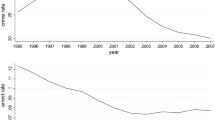Abstract
Efficiency considerations have played an increasing role in the development of legal doctrine over the last decades. Our paper investigates the consequences of the efficiency doctrine for the long run allocation of human resources between the legal profession and other professional activities. It is argued that a short run pursuit of the efficient scope of legislation may create an inefficient oversupply of lawyers under free entry into the legal profession. Self-regulation of entry into the legal profession by the bar association may provide higher aggregate welfare. Liberalization of professional entry can explain both the expansion of legislative activity and the unprecedented growth rate of the legal profession in many countries.
Similar content being viewed by others
References
Abel, Richard L. (1988a). “England and Wales-A Comparison of the Professional Projects of Barristers and Solicitors.” In R. L. Abel and P. S. C. Lewis (eds.), Lawyers in Society (Volume One)—The Common Law World, pp. 23–75, Berkeley: University of California Press.
Abel, Richard L. (1988b). “United States: The Contradictions of Professionalism.” In R. L. Abel and P. S. C. Lewis (eds.), Lawyers in Society Volume (One) —The Common Law World, pp. 186–243, Berkeley: University of California Press.
Abel, Richard L. (1988c). The Legal Profession in England and Wales, Oxford: Basil Blackwell Ltd.
Abel, Richard L. (1989). American Lawyers, New York and Oxford: Oxford University Press.
Alesina, Alberto and Perotti, Roberto (1995). “The Political Economy of Budget Deficits.” IMF Staff Papers. 42, 1–31.
Blankenburg, Erhard and Schultz, Ulrike (1988). “German Advocates: A Highly Regulated Profession.” In R. L. Abel and P. S. C. Lewis (eds.), Lawyers in Society (Volume Two) —The Civil Law World, pp. 124–159, Berkeley: University of California Press.
Boigeol, Anne (1988). “The French Bar: The Difficulties of Unifying a Divided Profession.” In R. L. Abel and P. S. C. Lewis (eds.), Lawyers in Society (Volume Two) —The Civil Law World, pp. 258–294, Berkeley: University of California Press.
Dewatripont, Mathias and Tirole, Jean (1999). “Advocates.” Journal of Political Economy. 107, 1–39.
Easterlin, Richard A. (1995). “Preferences and Prices in Choice of Career: The Switch to Business, 1972-87.” Journal of Economic Behavior and Organization. 27, 1–34.
Ehrlich, I. and Posner, R. A. (1974). “An Economic Analysis of Legal Rule-making.” Journal of Legal Studies. 3, 257–286.
Frank, Robert H. and Cook, Philip J. (1995). The Winner-Take-All Society, New York: The Free Press.
Freeman, Richard B. (1971). The Market for College-Trained Manpower, Cambridge, MA: Harvard University Press.
Getz, Malcolm, Siegfried, John and Calvani, Terry (1981). “Competition at the Bar: The Correlation between the Bar Examination Pass Rate and the Profitability of Practice.” Virginia Law Review. 67, 863–885.
Grunsky, Wolfgang (1991). “Juristenausbildung in Deutschland-Educational Training of Judges and Lawyers.” In P. Gilles (ed.), Anwaltsberuf und Richterberuf in der heutigen Gesellschaft-Role and Organisation of Judges and Lawyers in Contemporary Societies, pp. 209–224, Baden-Baden: Nomos.
Huyse, Luc (1988). “Legal Experts in Belgium.” In R. L. Abel and P. S. C. Lewis (eds.), Lawyers in Society (Volume Two) —The Civil Law World, pp. 225–257, Berkeley: University of California Press.
Ingleby, Richard (1992). Solicitors and Divorce, Oxford: Clarendon Press.
Kaplow, Louis and Shavell, Steven (1992). “Private versus Socially Optimal Provision of Ex Ante Legal Advice.” Journal of Law, Economics and Organization. 8, 306–320.
Kaplow, Louis and Shavell, Steven (1996). “Accuracy in the Assessment of Damages.” Journal of Law and Economics. 49, 191–210.
Kirk, Harry (1976). Portrait of a Profession, London: Oyez Publishing.
Kirp, Davis L. and Jensen, Donald N. (1983). “What Does Due Process Do?” Public Interest. 73, 87–88.
Laguette, Serge-Pierre (1987). Lawyers in the European Community, Luxembourg: Office for Official Publications of the European Communities.
Lewis, Philip S. C. (1988). “Introduction.” In R. L. Abel and P. S. C. Lewis (eds.), Lawyers in Society Volume One) —The Common Law World, pp. 1–22, Berkeley: University of California Press.
Mankiw, N. Gregory and Whinston, Michael D. (1986). “Free Entry and Social Inefficiency.” Rand Journal of Economics. 17, 48–58.
Noll, Roger G. (1989). “Economic Perspectives on the Politics of Regulation.” In R. Schmalensee and R. Willig (eds.), Handbook of Industrial Organization, Volume II, pp. 1253–1287, Amsterdam: North-Holland.
Nordhaus, William D. (1989). “Alternative Approaches to the Political Business Cycle.” Brookings Papers on Economic Activity. 1989/2, 1–68.
Olgiati, Vittorio and Pocar, Valerio (1988). “The Italian Legal Profession: An Institutional Dilemma.” In R.L. Abel and P.S.C. Lewis (eds.), Lawyers in Society (Volume Two)-The Civil Law World, pp. 336–368, Berkeley: University of California Press.
Olson, Walter K. (1988). “New Directions in Liability Law.” Proceedings of the Academy of Political Science. 37, No 1.
Olson, Walter K. (1991). The Litigation Explosion: What Happened When America Unleashed the Lawsuit, New York: Thomas Talley Books-Dutton.
Pashigian, B. Peter (1977). “The Market for Lawyers: The Determinants of the Demand for and the Supply of Lawyers.” Journal of Law and Economics. 20, 53–85.
Priest, George L. (1996). “The Modern Expansion of Tort Liability: Its Sources, Its Effects, and Its Reform.” Journal of Economic Perspectives. 10, 31–50.
Rosen, Sherwin (1992). “The Market for Lawyers.” Journal of Law and Economics. 35, 215–246.
Schuyt, Kees (1988). “The Rise of Lawyers in the Dutch Welfare State.” In R.L. Abel and P.S.C. Lewis (eds.), Lawyers in Society (Volume Two) —The Civil Law World, pp. 200–224, Berkeley: University of California Press.
Shavell, Steven (1993). “The Optimal Structure of Law Enforcement.” Journal of Law and Economics. 16, 255–287.
Viscusi, W. Kip (1996). “Economic Foundations of the Current Regulatory Reform Efforts.” Journal of Economic Perspectives. 10, 119–134.
Wolfram, Charles W. (1978). “Barriers to Effective Public Participation in Regulation of the Legal Profession.” Minnesota Law Review. 62, 619–647.
Author information
Authors and Affiliations
About this article
Cite this article
Hau, H., Thum, M. Lawyers, Legislation and Social Welfare. European Journal of Law and Economics 9, 231–254 (2000). https://doi.org/10.1023/A:1018749105068
Issue Date:
DOI: https://doi.org/10.1023/A:1018749105068



